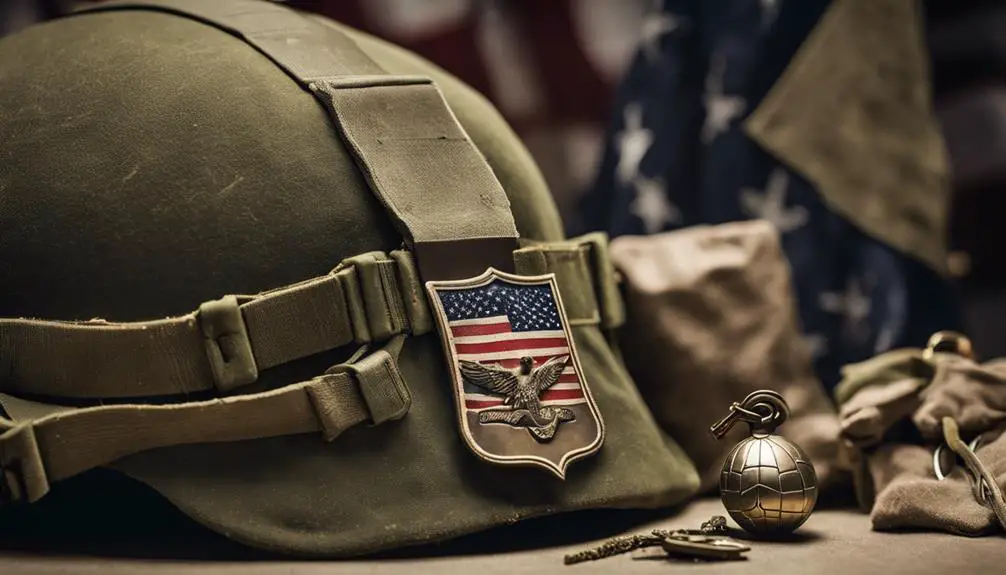You're curious about 'AMF' in military slang, but do you know its meaning and significance? 'Adios Mother F*er' is a common phrase used to express excitement or farewell, but it's just the tip of the iceberg. Military slang originated in World War I as a coping mechanism for soldiers, evolving through World War II and the Vietnam War, absorbing cultural influences. Today, it's essential for camaraderie, conveying ideas quickly, and coping with combat stress. As you explore the world of military slang, you'll uncover a unique dialect with service-specific terms**, acronyms, and coded language – and that's just the beginning of your journey into this fascinating world.
Origins of Military Slang
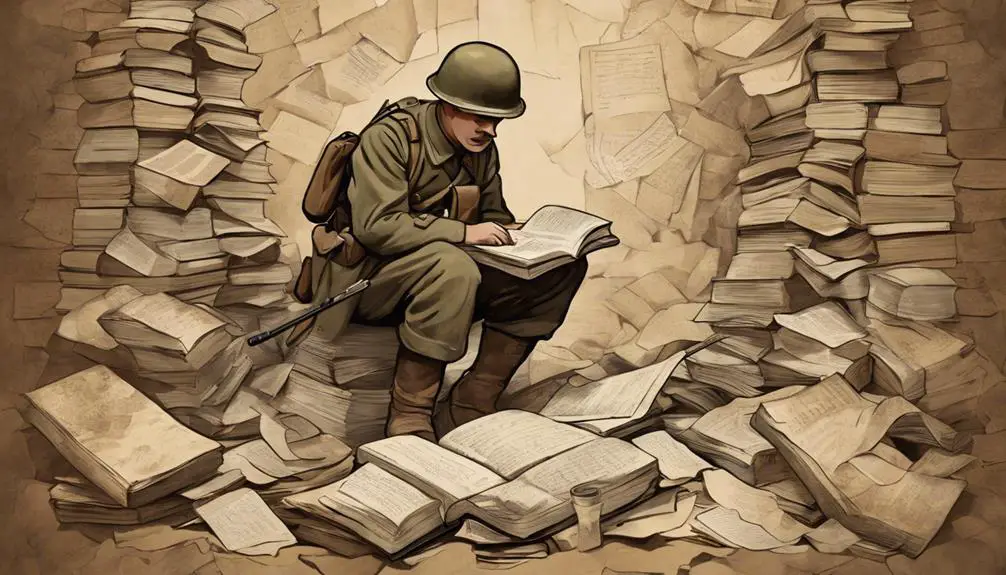
You're about to explore the fascinating world of military slang, and it all starts with its origins. Military slang has its roots in the early 20th century, emerging as a unique dialect that served as a coping mechanism for soldiers facing the harsh realities of war.
As you investigate the linguistic roots of military slang, you'll discover that it was born out of necessity. Soldiers needed a way to communicate quickly and efficiently, often in high-stress situations. This led to the development of a distinct dialect that was both functional and creative.
Historical development played a significant role in shaping military slang. During World War I, soldiers from different regions and backgrounds came together, bringing with them their unique linguistic styles. As they interacted, they borrowed words and phrases from each other, creating a distinct military dialect.
This dialect continued to evolve throughout World War II and the Vietnam War, absorbing influences from various cultural and regional backgrounds. As you continue to explore military slang, you'll uncover the rich history and cultural nuances that have shaped this unique language.
Common Acronyms and Terms
Military personnel rely heavily on a plethora of acronyms and terms that have become an integral part of their daily communication. You'll often hear them tossing around abbreviations like 'SITREP' (situation report) or 'OPSEC' (operational security). These acronyms serve as a kind of shorthand, allowing personnel to quickly convey complex information in high-pressure situations.
As a Code Breaker, you'll need to decipher these cryptic terms to stay in the loop. For instance, 'FOB' might refer to a forward operating base, while 'CQB' stands for close quarters battle.
Slang Decoders, on the other hand, help decode the informal language used among troops. They'll help you understand why a 'HOOAH' (a term of enthusiasm or agreement) is different from a 'HOO-ah' (a term used to express excitement or approval).
Mastering these acronyms and terms is essential for effective communication in the military. By familiarizing yourself with this specialized language, you'll be better equipped to navigate the complex world of military communication. So, the next time you hear someone mention 'EOD' (explosive ordnance disposal), you'll know exactly what they're talking about.
Service-Specific Slang Terms
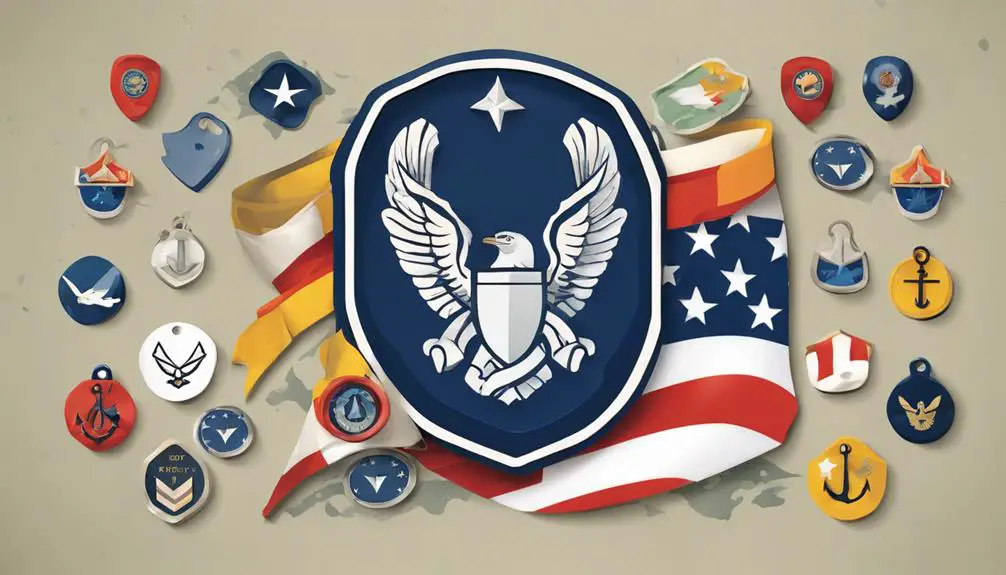
As you explore the world of military slang, you'll discover that each branch of the armed forces has its own unique terminology. This is because each branch has its own distinct culture, mission, and history, which have shaped their respective languages.
For instance, the Army has its own tactical vernacular, with terms like 'hooah' (meaning 'yes' or 'agreed') and 'FOB' (forward operating base). The Navy, on the other hand, has its own set of branch idioms, such as 'deck' (referring to the ship's deck) and 'galley' (the ship's kitchen).
The Air Force has its own lingo, with terms like 'sortie' (a single mission or flight) and 'ACE' (aerial combat engagement). The Marines, known for their esprit de corps, have their own distinct slang, including 'oorah' (a battle cry) and 'leatherneck' (a Marine Corps nickname).
Understanding these service-specific slang terms is essential for effective communication among service members. By recognizing and using these terms, you'll be able to navigate the nuances of military communication and better connect with members from different branches.
The Evolution of Military Lingo
One hundred years ago, a soldier's vocabulary was vastly different from what it is today. Slang terms emerged and evolved in response to advances in technology, changes in global politics, and shifting cultural norms. As you explore the history of military slang, you'll notice a fascinating pattern of adaptation and innovation.
In the early 20th century, World War I sparked a Lingo Revival. Soldiers created new terms to describe the unprecedented horrors of trench warfare. Later, during World War II, the need for secure communication led to the development of coded language and cryptic phrases.
In recent decades, the rise of multinational military coalitions has introduced Language Barriers. This prompted soldiers to devise creative workarounds and pidgins to facilitate communication across linguistic and cultural divides. Throughout this evolution, military slang has served as an essential tool for building camaraderie, conveying complex ideas quickly, and coping with the stresses of combat.
As you explore further into the world of military lingo, you'll discover a rich tapestry of language, culture, and history.
Slang in Modern Military Culture
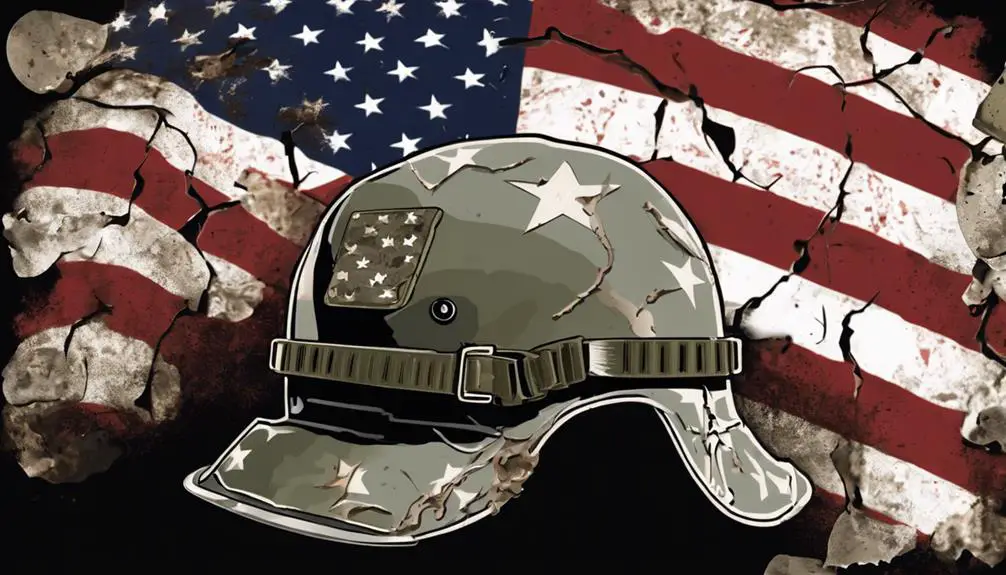
You're likely familiar with the phrase 'hurry up and wait,' which reflects the frustrating pace of military operations, where rapid deployment can be followed by long periods of inactivity. This phrase is just one example of the unique slang that permeates modern military culture.
Military slang serves as an essential aspect of military identity, allowing service members to bond over shared experiences and create a sense of community. This cultural fusion of military and civilian language has given rise to a distinctive lexicon that's both functional and expressive.
In today's military, slang is used to convey complex ideas quickly and efficiently, often in high-stress situations. It's also used to poke fun at the military's bureaucratic red tape or to express frustration with the slow pace of operations.
As you explore modern military culture, you'll find that slang is woven into the fabric of everyday conversation, from casual banter to formal briefings. By embracing this unique aspect of military culture, you'll gain a deeper understanding of the values, attitudes, and experiences that shape military identity.
Deciphering Military Abbreviations
In the military, you'll encounter a plethora of abbreviations that can seem like a secret code to outsiders, but deciphering them is important to understanding military communications. Code breaking is an essential skill for anyone working in the military or with military personnel. Acronym overload can be overwhelming, but with practice, you'll become proficient in deciphering these abbreviations.
Here are a few examples of common military abbreviations:
| Abbreviation | Meaning |
|---|---|
| ASAP | As Soon As Possible |
| CO | Commanding Officer |
| KIA | Killed In Action |
To improve your code-breaking skills, start by familiarizing yourself with common abbreviations like those above. You can also practice deciphering longer abbreviations by breaking them down into smaller parts. Remember, understanding military abbreviations is key to effective communication in the military. With practice and patience, you'll be deciphering like a pro in no time.
Slang and Camaraderie in Combat
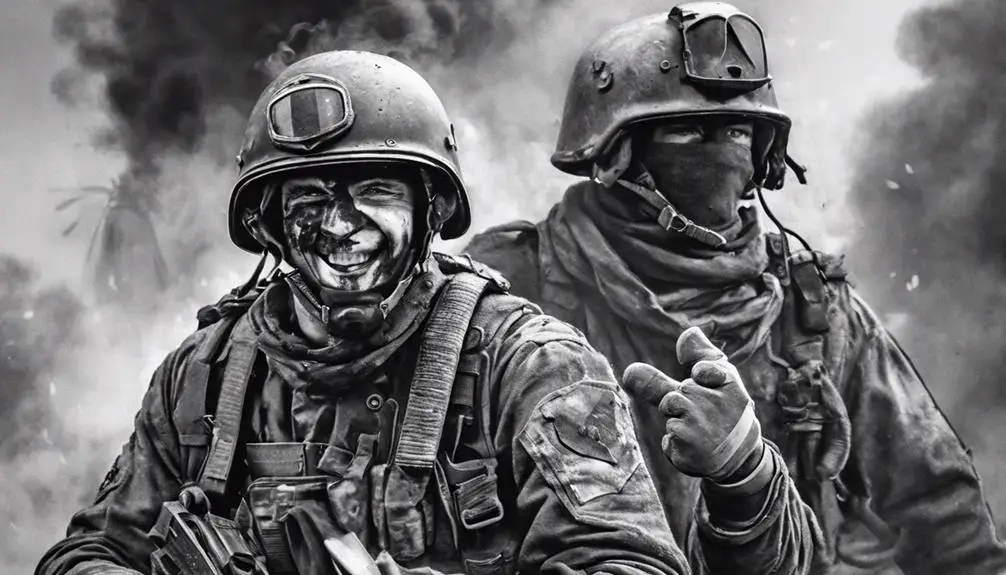
As you navigate the military's complex communication landscape, you'll encounter a unique aspect of military culture: slang that fosters camaraderie in combat. This slang serves as a bonding agent, creating strong Battle Bonds among troops.
In the heat of battle, Foxhole Humor emerges as a coping mechanism, allowing soldiers to momentarily forget the dangers surrounding them. This humor is often irreverent, sarcastic, and dark, but it helps to ease tension and create a sense of unity.
In combat zones, slang becomes a shared language, understood only by those who've experienced the same intensity of combat. It's a secret handshake, a wink, and a nod that says, 'I've got your back.' This camaraderie born from shared experiences and slang helps troops rely on each other, creating an unbreakable bond.
When you're in the trenches, you need to trust your fellow soldier with your life, and slang becomes a crucial part of that trust. It's a reminder that, amidst the chaos, you're not alone.
Lost in Translation: Civilian Misconceptions
Since leaving the military, many veterans have encountered a frustrating phenomenon: civilians misinterpreting or misunderstanding the slang and lingo that were once second nature to them.
You may have experienced this firsthand – trying to explain a military joke or reference to a civilian friend, only to be met with confusion or awkward silence. This culture clash can be attributed to a language barrier that exists between the military and civilian worlds.
As a veteran, you're not alone in feeling like you're speaking a different language. Military slang and jargon are often unique to the military culture, and civilians may not understand the nuances of these terms.
For instance, using acronyms like 'SITREP' or 'HQ' might leave civilians scratching their heads. This language barrier can lead to feelings of frustration and isolation, making it difficult for veterans to connect with civilians.
Frequently Asked Questions
Are Military Slang Terms Used by All Branches of the Military?
You're wondering if military slang terms are used by all branches of the military. The answer is, it depends.
While some slang terms are universally adopted across branches, others are unique to specific branches or have different meanings.
For instance, the Army's 'Hooah' mightn't be commonly used in the Navy. Branch differences exist, but some terms have achieved universal adoption, bridging the gap between services.
Can Civilians Learn and Use Military Slang Effectively?
You might be surprised to know that 70% of civilians who try to use military slang end up sounding inauthentic.
When it comes to using military slang effectively, you'll face challenges like cultural appropriation and language barriers. Without a deep understanding of the military culture, you risk misusing terms or offending veterans.
To avoid this, educate yourself on the context and nuances behind each term, and use them thoughtfully to show respect, not appropriation.
Is Military Slang Only Used for Communication in Combat Zones?
You might think military slang is only used in combat zones, but that's not the case. In reality, it's used in various military contexts, conveying operational nuance and cultural significance.
You'll find it in training exercises, team briefings, and even casual conversations among service members. It's a language that fosters camaraderie, efficiency, and shared understanding.
Are Military Slang Terms Officially Recognized by the Military?
You might think military slang is just a casual language used among troops, but the truth is, it's more formal than you think.
When it comes to official recognition, the answer is yes, military slang terms are officially recognized by the military. In fact, the Military Lexicon is a formal guide that documents and standardizes military terminology, making it an Official Vernacular.
This recognition acknowledges the importance of slang in military communication, ensuring clarity and efficiency in critical situations.
Do Military Slang Terms Vary Across Different Military Ranks?
As you navigate the military hierarchy, you'll notice that slang terms vary across different ranks. You'll pick up on rank-specific jargon, like 'butterbar' for a new second lieutenant.
Even the way officers give commands, known as their cadence, differs. Higher-ranking officers tend to use more formal language, while lower-ranking personnel use more colloquial terms.
You'll need to adapt to these nuances to effectively communicate with your unit.
Conclusion
You've explored the world of military slang, where acronyms and terms can be as thick as fog. But now that you've cleared the haze, you see that military lingo is more than just a language – it's a badge of honor, a symbol of camaraderie, and a thread that weaves troops together.
As the saying goes, 'when in Rome, do as the Romans do.' In military culture, speaking the language is being part of the tribe.

